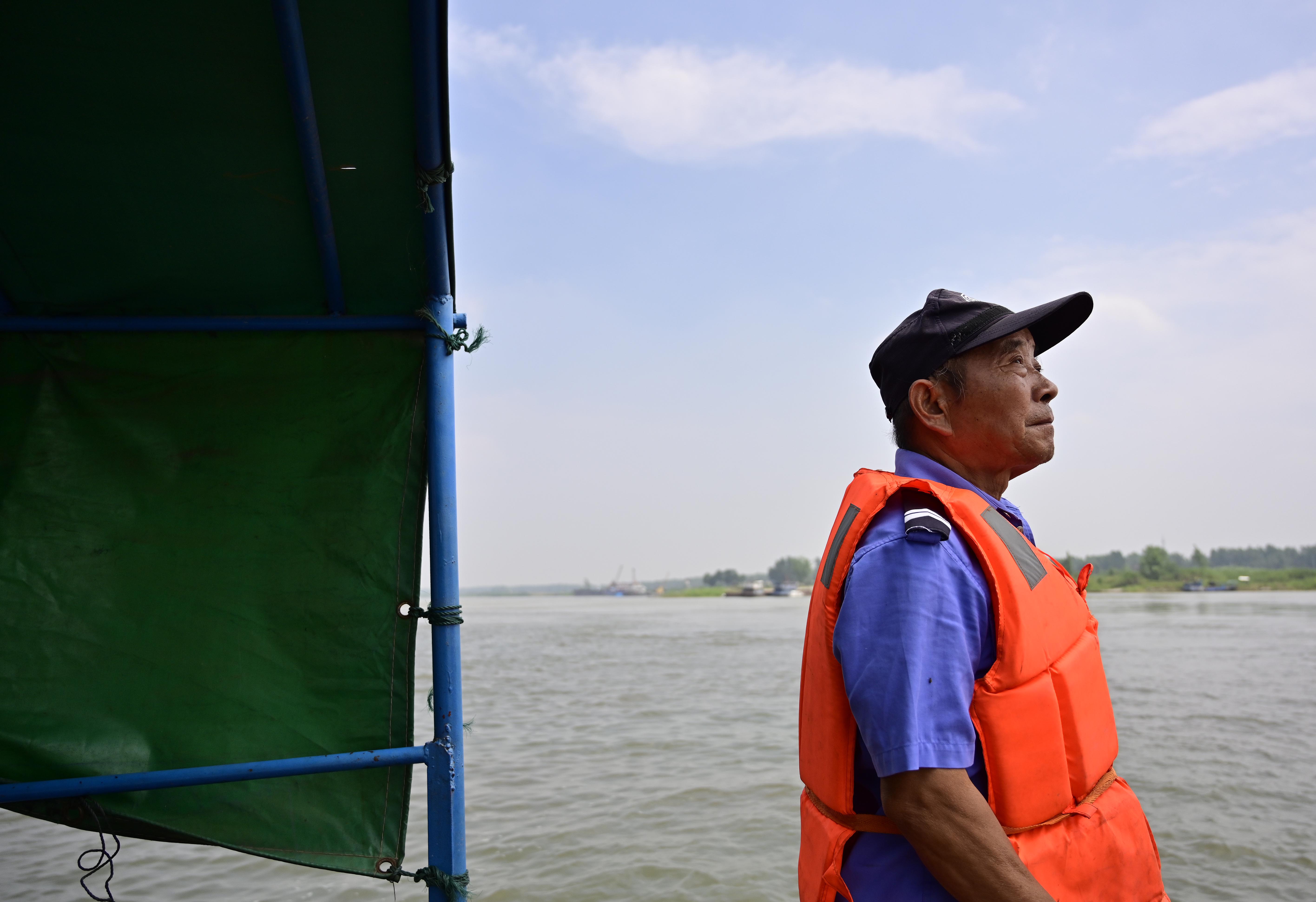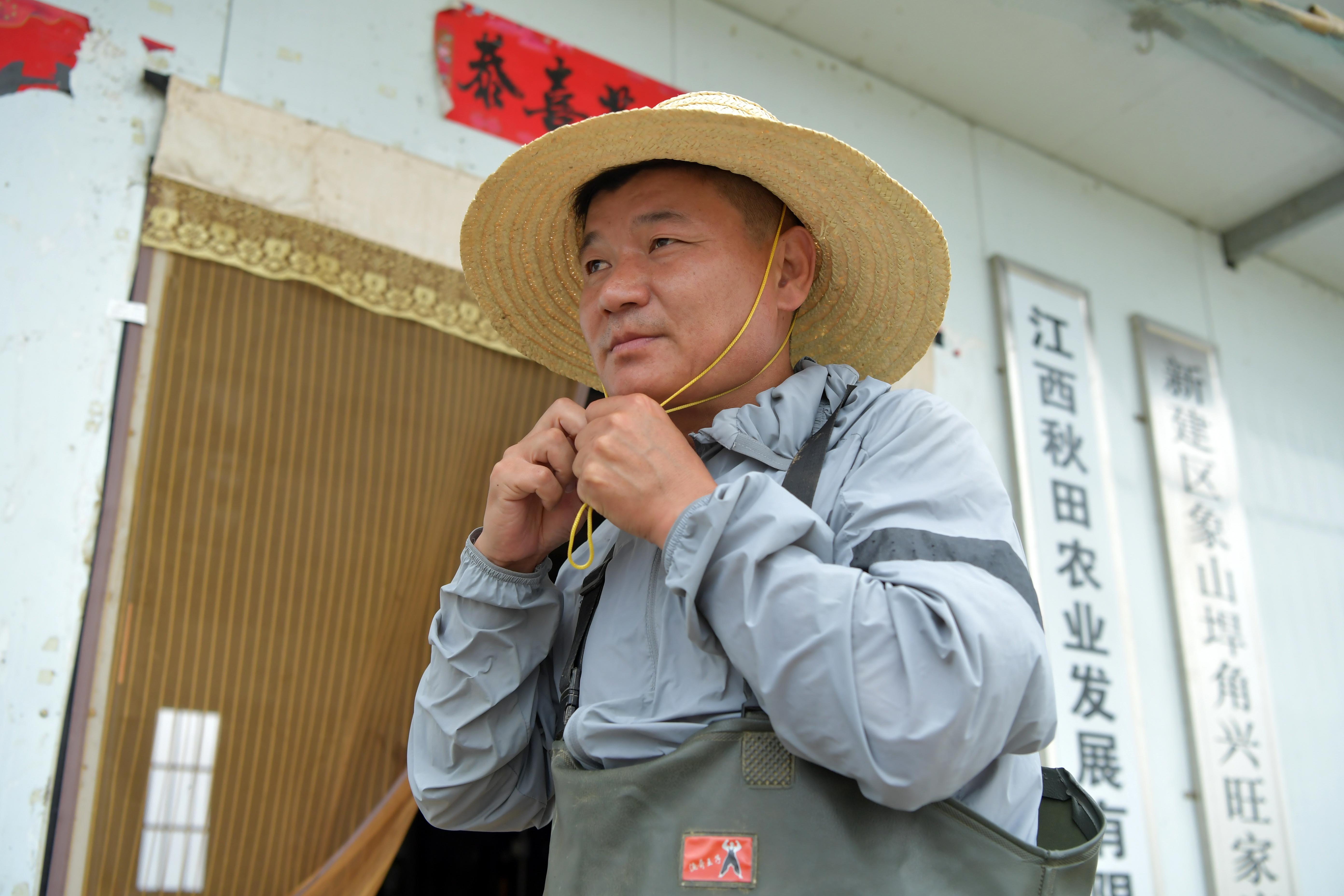

NANCHANG, June 28 (Xinhua) -- China began a 10-year fishing moratorium from the beginning of this year in 332 conservation areas in the Yangtze River basin, which will be expanded to all the natural waterways of the country's longest river and its major tributaries from no later than Jan. 1, 2021.
The full-scale ban is likely to affect more than 113,000 fishing boats and nearly 280,000 fishermen in 10 provincial-level regions along the river, according to earlier estimation.

Members of a Yangtze finless porpoise protection team take part in a patrol mission on the Poyang Lake in Hukou County, east China's Jiangxi Province, June 8, 2020. Eight of the 11 team members are fishermen-turned finless porpoise protectors who patrol the Poyang Lake on a daily basis. Their missions include dismantling illegal fishing facilities and preventing unlawful activities that damage the Poyang Lake's fisheries resources. (Xinhua/Peng Zhaozhi)
This comes after decades of human activities such as water pollution, overfishing, sand excavation and quarrying have caused serious ecological destruction in the Yangtze River basin.
The Yangtze, which stretches over 6,300 km, boasts rich and complex terrain and climate along its basin and has one of the highest levels of biodiversity in the world.

Wu Houchun, an ex-fisherman who works at a Yangtze finless porpoise protection team, takes part in a patrol mission on Poyang Lake in Hukou County, east China's Jiangxi Province, June 8, 2020. (Xinhua/Peng Zhaozhi)
Official data shows that the average annual fishing output in the Yangtze River is less than 100,000 tonnes, accounting for only 0.15 percent of the national total, which has set alarm bells ringing for the need to take immediate action to restore its ecology.
In areas around the Poyang Lake, China's largest freshwater lake in the eastern province of Jiangxi, there are more than 300 traditional fishing villages housing over 100,000 residents. Due to the ban, those fishermen will have to bid farewell to their traditional roles and embrace new identities ashore.

Aerial photo shows Wu Huashan harvesting crayfish at his fish pond in Xiangshan Township of Nanchang, east China's Jiangxi Province, June 5, 2020. Having learned fishing at an early age with his parents, Wu was a skilled fisherman and was head of a local fishery association. In late 2019, he bade farewell to his boats and started a crayfish business. (Xinhua/Peng Zhaozhi)
FINLESS PORPOISE PROTECTOR
Shu Yin'an, 53, born of a fishing family of three generations, is currently working as a patroller in a Yangtze finless porpoise protection team in Hukou County, Jiangxi Province.
The finless porpoise, an endemic species in China, is an important indicator of the ecology of the Yangtze.
Known for its mischievous smile, the finless porpoise has a level of intelligence comparable to that of a gorilla. However, they rely on abundant food supply for survival. In recent years, overfishing in the Yangtze River has contributed to the decrease in their number.
"I grew up on the Poyang Lake and finless porpoises used to be common here, but they've been seldomly spotted in recent years," said Shu, who decided to wave goodbye to his fishing boat and nets and began a new life ashore in 2017. In June that year, he went aboard again with a new career as a finless porpoise protector.

Members of a Yangtze finless porpoise protection team attend a mission briefing ahead of a daily patrol on the Poyang Lake in Hukou County, east China's Jiangxi Province, June 8, 2020. Eight of the 11 team members are fishermen-turned finless porpoise protectors who patrol the Poyang Lake on a daily basis. Their missions include dismantling illegal fishing facilities and preventing unlawful activities that damage the Poyang Lake's fisheries resources. (Xinhua/Peng Zhaozhi)
Zhang Chuanguo, Shu's colleague, intended to have his two sons inherit his fishing boats after his retirement. But the 65-year-old was frustrated to find that catches of the once fish-rich lake have been dramatically dwindling.
"We shouldn't leave a devastated river for future generations," said Zhang.
"I'm proud to be a finless porpoise protector," he said. "We are fighting to secure a better life for the people living around the Poyang Lake and in the Yangtze River basin."
RAISING CRAYFISH
Wu Huashan, 42, never regretted stepping ashore. The former fisherman now farms over 26 hectares of paddy fields to raise crayfish. In just a few months this year, Wu has earned more than 300,000 yuan (about 42,400 U.S. dollars) from selling crayfish alone -- an income he could only dream of during his decades as a fisherman.
Having learned fishing at an early age with his parents, Wu was a skilled fisherman and was head of a local fishery association.

Wu Huashan wears an outfit to harvest crayfish in Xiangshan Township of Nanchang, east China's Jiangxi Province, June 5, 2020. (Xinhua/Peng Zhaozhi)
"The catch started getting smaller and smaller," said Wu. "In the past when I went fishing with my father, we would catch more than 500 kg of fish every day. The number has fallen to just dozens of kilograms in recent years."
Last year, he bade farewell to his boats and received more than 70,000 yuan in subsidies, 12,000 yuan of living expenses and social insurance paid by the government.

Wu Huashan displays photos of the fishing boats he once owned in Xiangshan Township, Nanchang, east China's Jiangxi Province, June 5, 2020. (Xinhua/Peng Zhaozhi)
"I was lost and had no idea what I should do next," recalled Wu. With the help of the local government, he finally chose to invest in crayfish, a delicacy popular with many Chinese foodies.
Now he has turned into a crayfish expert. "The key to raising crayfish is to keep the water clean. I've had a good harvest this year and plan to try growing rice in the paddy fields this year," said Wu.
TOURISM SERVICES PROVIDER
Zhu Yicai, a 67-year-old ex-fisherman in Yugan County, is the living embodiment of an old Chinese adage -- those living on a mountain live off the mountain, those living by water live off the water.
He used to make a living by selling aquatic products captured in the Poyang Lake. He is now taking advantage of the beautiful scenery around the lake.

Zhu Yicai conducts guestroom check at his farmhouse in the Poyang Lake scenic area in Yugan County, east China's Jiangxi Province, June 16, 2020. Zhu Yicai gave up his fishing business in 2012 due to the worsening aquatic environment in the Poyang Lake. In 2018, Zhu was running a family farm when he noticed that lots of tourists came to the lake to watch migratory birds. Zhu then captured the business opportunity and opened a 1,800-square-meter farmhouse. (Xinhua/Peng Zhaozhi)
Decades of environmental protection have made the Poyang Lake an important hub for migratory birds, hosting up to 700,000 wintering birds every year. Local government has been taking advantage of the tourism resources by organizing a range of activities such as a bird-watching festival to lure tourists.
It has also been encouraging fishermen to step ashore and take part in tourism-related industry by offering training on restaurant management and other skills to make them more competitive.
Zhu opened a fish farm in 2012 and saw many tourists come to watch birds. Believing that birdwatching would be a good business opportunity, Zhu built a 1,800-square-meter farmhouse, which can accommodate more than 200 people dining at the same time, in February 2018.

Zhu Yicai (3rd L) serves guests at his farmhouse in the Poyang Lake scenic area in Yugan County, east China's Jiangxi Province, June 16, 2020. (Xinhua/Peng Zhaozhi)
"We closed earlier this year due to the COVID-19 epidemic, but we've already made over 300,000 yuan since we reopened in March," Zhu said.
"Many tourists come here to relax and unwind. We can host nearly 200 people at the weekend in high seasons," Zhu said.
Tourism brought the family a gross income of 1 million yuan last year and Zhu intends to convert the second floor of his home into a B&B to host more tourists.

 Award-winning photos show poverty reduction achievements in NE China's Jilin province
Award-winning photos show poverty reduction achievements in NE China's Jilin province People dance to greet advent of New Year in Ameiqituo Town, Guizhou
People dance to greet advent of New Year in Ameiqituo Town, Guizhou Fire brigade in Shanghai holds group wedding
Fire brigade in Shanghai holds group wedding Tourists enjoy ice sculptures in Datan Town, north China
Tourists enjoy ice sculptures in Datan Town, north China Sunset scenery of Dayan Pagoda in Xi'an
Sunset scenery of Dayan Pagoda in Xi'an Tourists have fun at scenic spot in Nanlong Town, NW China
Tourists have fun at scenic spot in Nanlong Town, NW China Harbin attracts tourists by making best use of ice in winter
Harbin attracts tourists by making best use of ice in winter In pics: FIS Alpine Ski Women's World Cup Slalom
In pics: FIS Alpine Ski Women's World Cup Slalom Black-necked cranes rest at reservoir in Lhunzhub County, Lhasa
Black-necked cranes rest at reservoir in Lhunzhub County, Lhasa China's FAST telescope will be available to foreign scientists in April
China's FAST telescope will be available to foreign scientists in April